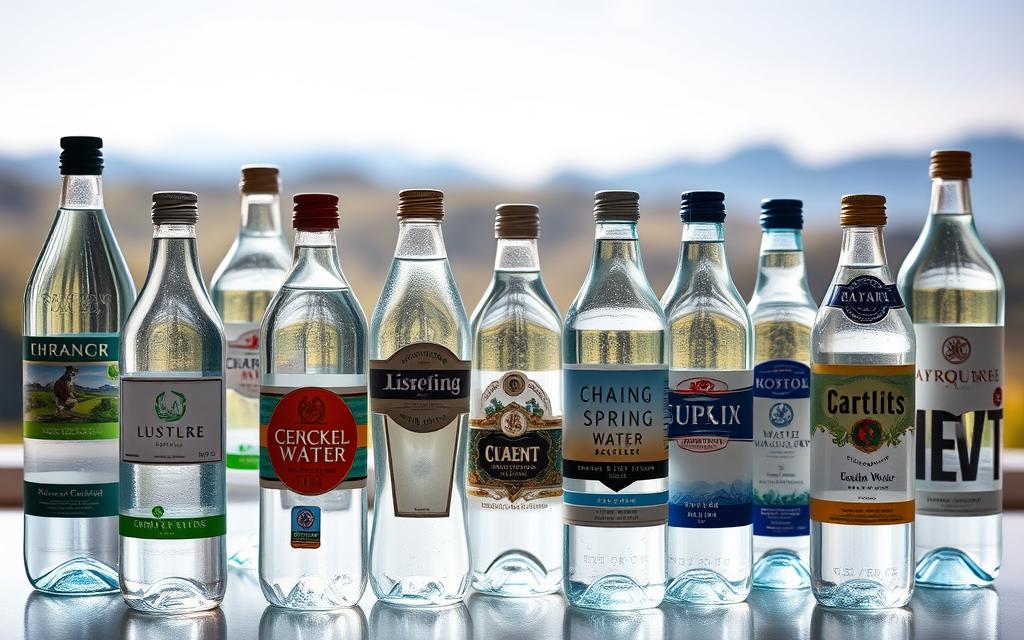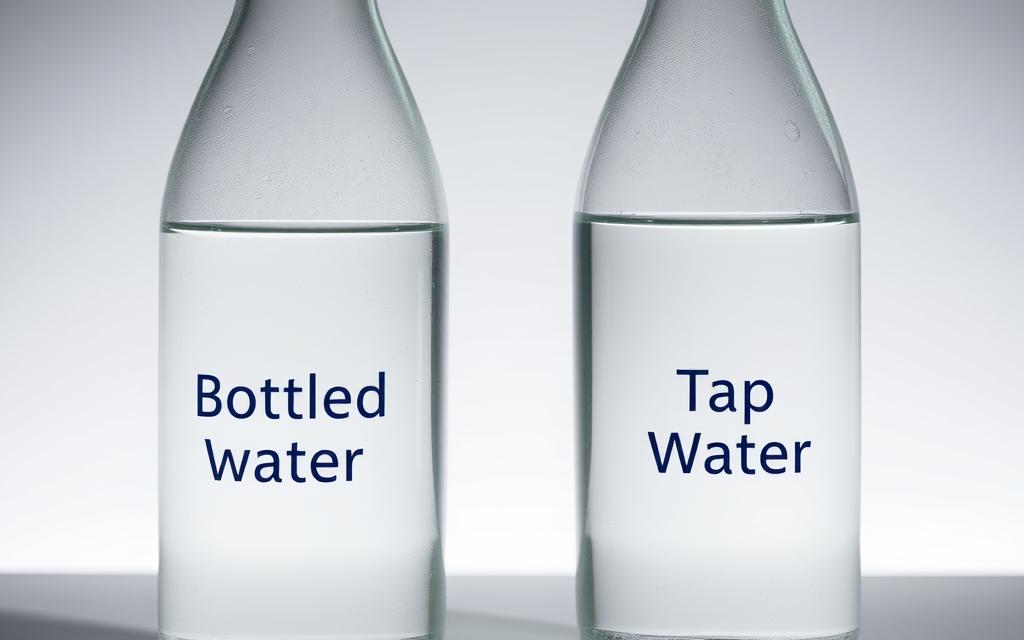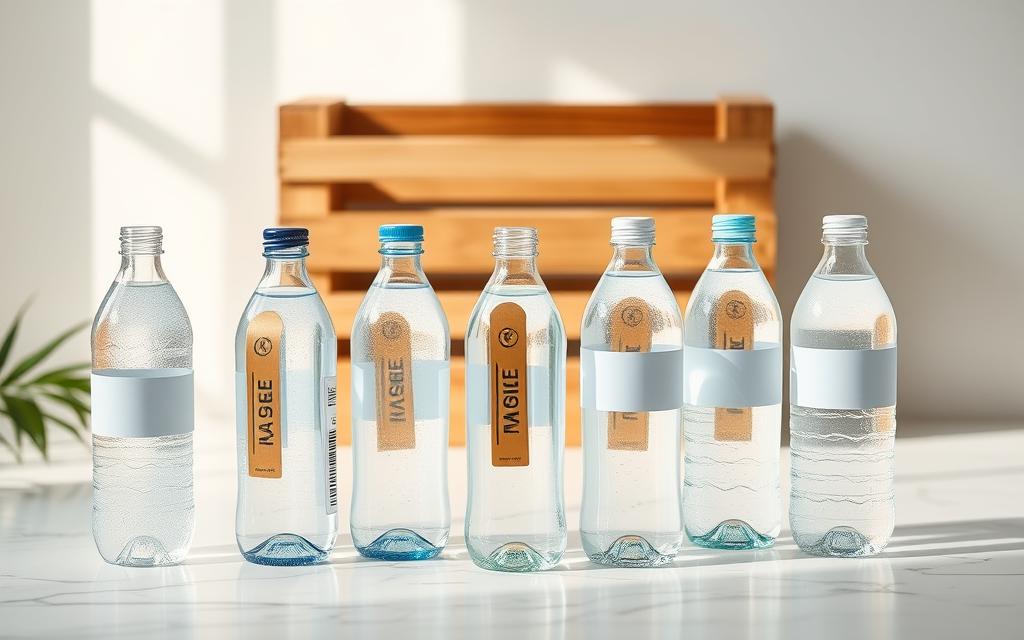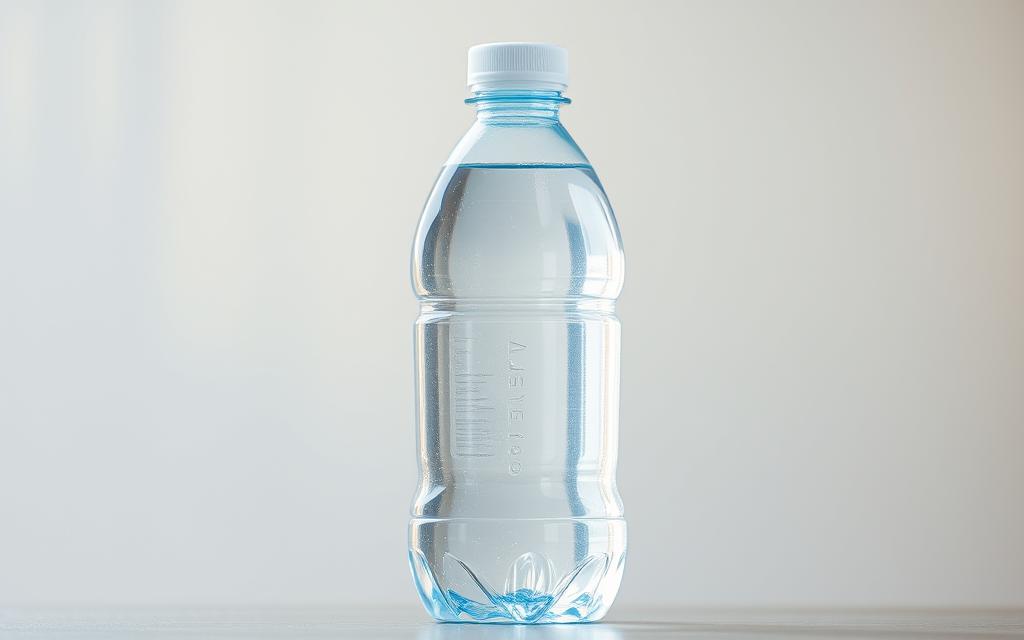Ever thought if bottled water is healthier than tap water? I’ve explored hydration deeply and I’m here to share what I found. It might surprise you.
Is bottled water really better for you? The answer is not simple. Many believe it’s better, but the truth is more complex. Marketing tricks and misconceptions often confuse us.
We’ll dive into the world of bottled water together. We’ll look at safety, quality, and how your choices affect the environment. My aim is to give you real insights, not just what you might assume.
Key Takeaways
- Bottled water isn’t always healthier than tap water
- Environmental impacts are significant with bottled water
- Regulations for bottled water vary widely
- Cost of bottled water can be substantially higher
- Personal research is key for making smart hydration choices
Overview of Bottled Water

Bottled water is a common choice for staying hydrated in many homes. I’ve looked into many bottled water brands and their benefits. Here’s what you should know about this popular drink.
What Constitutes Bottled Water?
Bottled water is more than just water in a bottle. It’s a product that comes from various sources. Most bottled water is from:
- Natural spring sources
- Municipal water supplies
- Purified tap water
- Underground aquifers
Types of Bottled Water Available
The market offers different types of bottled water:
- Spring Water: From natural springs
- Purified Water: Treated to remove impurities
- Mineral Water: Has natural minerals
- Alkaline Water: Has a special pH balance
Popular Brands in the Market
Well-known brands include Dasani, Aquafina, Evian, and Smartwater. Each brand has its own unique features that attract different customers.
Knowing where and how your bottled water is made can help you choose better.
The Convenience Factor of Bottled Water
In today’s fast world, convenience is key. Bottled water is a quick way to stay hydrated for those always on the go. It’s not just for thirst; it fits into our busy lives.
Accessibility and Portability
Bottled water is super convenient for the busy. It’s easy to grab when you’re in a hurry or exercising. The benefits are clear:
- Instant hydration without searching for water sources
- Lightweight and easy to carry in bags or backpacks
- Available in various sizes for different needs
- Sealed packaging ensures cleanliness
Ideal for Busy Lifestyles
For professionals, athletes, and students, bottled water is a must. Convenience trumps everything when you’re busy and need water fast.
Environmental Impact of Convenience
The environmental cost of bottled water is high. It uses a lot of resources to make and transport. In the U.S., it uses 30 million barrels of oil a year. It also produces carbon dioxide like 2 million cars.
“Convenience comes with a environmental price tag we must consider.” – Environmental Research Group
It’s smart to find a balance between convenience and caring for the planet. Use reusable bottles or choose brands that are eco-friendly. This way, you can enjoy bottled water without harming the environment.
Nutritional Comparison: Bottled vs. Tap Water
Choosing between bottled water and tap water is important for staying hydrated. The debate is not just about which is better for drinking. It also involves the minerals, contaminants, and health effects of each.
Essential Minerals in Bottled Water
Not all water is the same. Bottled water can have different levels of important minerals. These minerals help meet our daily nutritional needs.
- Calcium: Supports bone health
- Magnesium: Helps muscle and nerve function
- Potassium: Regulates blood pressure
- Sodium: Maintains electrolyte balance
Contaminants in Tap Water
Even though tap water is regulated, it can have trace contaminants. Studies have found:
- Lead from old pipes
- Chlorine used in treatment
- Microplastics from pollution
- Chemicals from agricultural runoff
“Water quality is not just about what you can see, but what scientific testing reveals.” – Environmental Health Expert
Hydration and Health Benefits
The main goal of any water is to keep us hydrated. Both bottled and tap water can help meet our hydration needs. The important thing is to pick a source that is clean and safe.
If you worry about water quality, think about using a home filter. Or choose bottled water with good mineral content and strict testing.
Safety and Quality of Bottled Water
Understanding the rules about bottled water safety is key. People often ask: Is bottled water really better for you? Let’s explore the important parts of bottled water safety and quality.
The safety of bottled water has many checks. The Food and Drug Administration (FDA) sees bottled water as a food item. This means it must go through strict tests and meet high quality standards to keep consumers safe.
Regulations Governing Bottled Water
My research shows some important facts about bottled water rules:
- FDA requires strict tests for harmful chemicals and germs
- Water must be very pure before it’s packaged
- Regular checks make sure the water stays good quality
Addressing Safety Misconceptions
Many people have wrong ideas about bottled water safety. Not all bottled water is the same. Here are some key points:
- Bottled water isn’t always safer than tap water
- Some brands test their water more than others
- The plastic bottles can sometimes add harmful chemicals
| Water Source | Regulation Agency | Testing Frequency |
|---|---|---|
| Municipal Tap Water | EPA | Daily |
| Bottled Water | FDA | Weekly/Monthly |
Choosing Quality Bottled Water
When picking bottled water, look for brands that:
- Share where the water comes from
- Post detailed water quality reports
- Use BPA-free bottles
- Get tested by outside groups
Knowing these things helps you choose safer bottled water. This way, you can make better choices for your health.
Environmental Concerns of Bottled Water
The environmental impact of bottled water is a big issue. It’s not just about staying hydrated. It also causes a lot of harm to our planet.
Plastic Waste and Recycling Challenges
Plastic waste from water bottles is a huge problem. About 80% of these bottles end up in landfills or littering our environment. Only 1 in 5 bottles are recycled, leading to a lot of waste that hurts our ecosystems.
- 80% of plastic bottles are not recycled
- Bottles take up to 450 years to decompose
- Plastic waste generates significant carbon emissions
Water Source Sustainability
Many water bottles are made from water taken from local communities. This can deplete natural water sources. This practice raises serious questions about sustainable water management and its long-term environmental consequences.
Innovations in Eco-Friendly Bottled Water
But, there’s good news. Some companies are working on better solutions. They’re making:
- Biodegradable water bottles
- Recycled plastic packaging
- Water sourced from renewable resources
When choosing bottled water, think about the environmental impact. Pick brands that care about the planet. This way, you can make a difference in how we hydrate.
Cost Analysis of Bottled Water
Looking into whether bottled water is worth the cost reveals surprising facts. Many people don’t realize how much they spend on bottled water compared to tap water.
Let’s examine the real cost of drinking bottled water:
- Average bottled water costs $1.50 per 16-ounce bottle
- Tap water costs about $0.002 per gallon
- Annual bottled water expenses can be $500-$1,800 per person
Price Comparison Insights
Bottled water can be 610 times more expensive than tap water. This big difference shows that people pay extra for convenience and quality.
“The most expensive water is the water you never drink” – Water Conservation Expert
Budget-Friendly Alternatives
To save money and stay hydrated, try these tips:
- Invest in a reusable water filter pitcher
- Purchase a high-quality water bottle
- Use home filtration systems
Hidden Costs of Bottled Water
Bottled water has more than just a price tag. It also has environmental and economic costs. These include plastic production, transportation, and disposal.
Knowing the true cost of bottled water can guide you to better choices. These choices can save you money and help the environment.
The Taste Factor: Bottled vs. Tap
Water might seem simple, but its taste can change a lot. When we compare bottled water to tap water, taste is key. Many people choose bottled water for its taste, not just to stay hydrated.
Flavor Profiles Across Brands
Different bottled water brands have their own tastes. Some common flavors include:
- Mineral-rich waters with subtle earthy notes
- Crisp, clean-tasting spring waters
- Filtered waters with minimal mineral content
Regional Taste Preferences
Taste preferences vary across the United States. Coastal regions might prefer waters with slight mineral undertones, while mountain states often enjoy crisp, pure-tasting waters. Local water sources and geological conditions greatly affect taste.
Impact of Taste on Water Consumption
Taste affects how much water we drink. Many find bottled water tastier than tap water. This leads to more hydration. The better taste of bottled water encourages drinking more, which can boost health and wellness.
Taste is not just about flavor—it’s about the entire sensory experience of hydration.
Hydration and Performance: The Athlete’s Choice
Athletes know that staying hydrated is key to doing their best. Whether you’re a weekend athlete or a pro, choosing the right drink can really help your game.
Drinking bottled water does more than just quench thirst. It can affect how well you perform in different ways.
Bottled Water in Sports Nutrition
When athletes pick their drinks, they should think about a few things:
- Regular water is great for most activities
- Electrolyte-enhanced waters are better for long, hard workouts
- Drinks with minerals help muscles work better and recover faster
Electrolyte Drinks vs. Regular Bottled Water
Not all drinks are the same. For short exercises, plain water is fine. But for long, hard workouts, you might need more.
Here’s when to choose each:
- Short workouts (under 60 minutes): Regular bottled water is enough
- Endurance activities: You’ll need electrolyte drinks
- High-intensity training: Go for specialized sports drinks
Hydration Strategies for Active Lifestyles
Every athlete should have a hydration plan that fits them. Pay attention to how much you drink and what you need. This helps you stay hydrated and perform at your best.
Staying properly hydrated isn’t just about drinking water—it’s about drinking the right water at the right time.
Health Claims Associated with Bottled Water
Bottled water ads often claim amazing health benefits. But are these claims true? Let’s look at the most common health claims about bottled water. We’ll see what’s real and what’s just marketing.
Sparkling Waters and Digestive Health
Many think sparkling water helps with digestion. Studies show it might help with:
- Reducing constipation
- Making you feel fuller
- Lessening indigestion
While bottled water has some benefits, not all claims are proven. Sparkling water is a nice change from regular water. But it’s not a magic fix.
Alkaline Water: Reality or Myth?
Is alkaline bottled water better for you? The answer is not clear. Some say it can:
- Balance body acid
- Speed up metabolism
- Hydrate better
But scientists say we need more studies to be sure.
Hydration and Skin Health Connections
Drinking enough water is key for healthy skin. Bottled water can help with your daily water needs. But how it affects your skin depends on many things.
| Hydration Factor | Potential Skin Impact |
|---|---|
| Water Intake | Improves skin elasticity |
| Mineral Content | Can support skin health |
| Consistent Hydration | Reduces dry skin appearance |
While bottled water is good for staying hydrated, it’s not a magic bullet. A healthy diet, lifestyle, and enough water are key for your health.
Public Perception and Trends in Bottled Water
The world of bottled water has changed a lot in the last ten years. People are now more careful about what they drink, thanks to health concerns and new market trends. Brands have started to offer more choices to keep up with these changes.
Choosing bottled water is now more complicated than ever. People want more than just to stay hydrated. They look for extra benefits and unique experiences.
Consumer Preferences Shifting Rapidly
Recent studies have shown interesting facts about bottled water:
- People who care about health look for waters with minerals.
- More and more, people want to buy products that are good for the planet.
- Younger folks like waters that taste good and have extra benefits.
The Rise of Functional Waters
New types of water are coming out, each with its own special feature:
| Water Type | Target Benefit | Key Brands |
|---|---|---|
| Alkaline Water | pH Balance | Essentia, Core |
| Electrolyte Water | Hydration | Smartwater, Propel |
| Vitamin-Infused Water | Nutrition | Vitaminwater, Bai |
Marketing’s Powerful Influence
Brands are using smart marketing to reach out to people. Packaging design, wellness messages, and how they fit into our lifestyle are key in making our choices.
The bottled water market is no longer about simple hydration—it’s about personal identity and lifestyle choices.
As tastes keep changing, bottled water brands need to stay quick, creative, and ready for new trends.
Conclusion: Is Bottled Water Worth It?
Exploring bottled water reveals it’s not always better for you. Many factors influence our water choices. This makes the decision complex.
We’ve learned a lot about staying hydrated, safety, and the environment. Bottled water is convenient and clean in some places. But, it’s not right for everyone. Whether it’s worth it depends on your needs and where you live.
If you want the best hydration, think about your situation. Look at your local tap water, health needs, and care for the planet. Some people need bottled water, while others prefer reusable containers and filtered tap water.
It’s important to make informed choices. Whether you pick bottled or tap water, know your source. Understand its health effects and choose what’s best for you and the planet.



